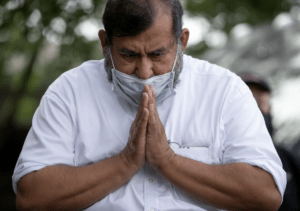This op-ed was co-authored by Dr. Octavio N. Martinez Jr., executive director for the Hogg Foundation for Mental Health and senior associate vice president for diversity and community engagement at The University of Texas at Austin, and Rudolph K. Metayer, President of the Texas Black Caucus Foundation. It was originally published by UT NEWS.
Just under 43,000 Texans have died from COVID-19. That is a staggering figure. Something else that is just as astonishing? According to a study by the Episcopal Health Foundation, racial and ethnic disparities were responsible for an additional 5,000 deaths from COVID-19 as of September 2020, accounting for 30% of all deaths at that time. It is obvious that our state’s ability to stay healthy is harmed by the inequitable distribution of lifesaving health care services among Texans.
This unnecessary loss of life costs us in all respects. The toll is not just emotional or psychological but also financial. This same study estimates that health disparities cost Texans $7.7 billion in excess medical spending and lost productivity.
Racial disparities in health outcomes are garnering new attention as the COVID-19 pandemic persists into another year. The White House COVID-19 Health Equity Task Force, established through an executive order by President Joe Biden, is the latest high-profile commitment to the goal of achieving health equity by addressing racial disparities. Now, as Texas continues its 87th legislative session, policymakers should leverage this national momentum by prioritizing the establishment of an office focused on health equity within the Texas Health and Human Services system.
The importance of establishing such an office is not just a matter of principle — it is also a matter of practicality. We know that health equity is politically determined. Racial disparities present themselves not just in our health care systems, but in all corners of life. Achieving equity means ensuring access for all Texans to jobs, homeownership, higher education, retirement savings, and other basic living necessities. When we coordinate our efforts to prioritize equity at a state level, all levels of Texas systems — mental health, education, juvenile justice, child welfare, disability services — will benefit. As will all Texans.
There are legislative proposals being developed aimed at tackling the structural inequities within our Texas systems. We contend that unless these efforts are coordinated by a single accountable state office, they will fail to achieve maximum impact. Equity is the responsibility of the state, and efforts to achieve it must therefore be at the state level, housed within the state government. A state office means better access to data for agencies and programs and provides a mechanism for holding agencies accountable for performance measures. It also means the ability to publish an annual report of cross-agency activities and expenditures dedicated to addressing disparities in Texas systems and services.
Establishing an Office of Health Equity would be a turning point for the state in its efforts to eliminate health disparities. Modeled after the current Office of Mental Health Coordination and the Statewide Behavioral Health Coordinating Council, a statewide equity coordinating council could develop and monitor a multi-year statewide cross-agency plan to address racial inequities and disparities. This strategy will maximize resources to address disparities, creating opportunities for efficiencies and preventing duplicate expenditures.
It is already too late to prevent the disproportionate impact that the COVID-19 pandemic has had on vulnerable communities, especially Black and Latino communities in Texas. But it is not too late to learn from these disparities and build strategies for a more equitable future. The first step is collecting better data on how and why COVID-19 has had a disproportionate impact. We must coordinate the collection of this data and learn from it so we are better able to promote health equity into the future and through the next pandemic or public health crisis. The well-being of all Texans depends on it.

